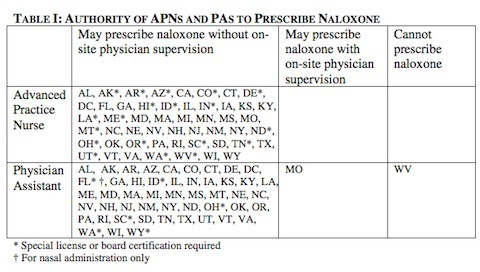A Quick Fix
 Given the state’s reputation as a mecca for opioid absuers, you will probably not be surprised to learn that West Virginia leads the nation in drug-overdose deaths. Yet the problem evidently has less to do with the sheer number of narcotics consumed than with a dangerous (and nonsensical) quirk of law:
Given the state’s reputation as a mecca for opioid absuers, you will probably not be surprised to learn that West Virginia leads the nation in drug-overdose deaths. Yet the problem evidently has less to do with the sheer number of narcotics consumed than with a dangerous (and nonsensical) quirk of law:
The state doesn’t allow police and firefighters to administer naloxone, a drug that counters the effects of pain-pill overdoses and saves lives during emergencies.
This is a terrible policy, since cops are typically quicker to arrive on scene than paramedics. Time and again, the evidence has shown that equipping the police with naloxone can significantly reduce the mortality rate among opioid addicts—a fact that is leading an increasing number of cities to adopt the harm-reduction approach.
Just as importantly, West Virginia is the sole place in the country where physician assistants are not allowed to prescribe naloxone (see above). Since overdose victims are likely to encounter such employees at understaffed hospitals before they see actual doctors or nurses, this prohibition can only lead to more sorrow. All of which raises a baffler of a question: who, exactly, is preventing the law from being changed in West Virginia? Whose interest does this serve, financially or otherwise? My best guess is that state politicians are under the mistaken impression that their constituents want addicts to pay the ultimate price for their mistakes. They underestimate the compassion and the pragmatism of those whose votes they need.




